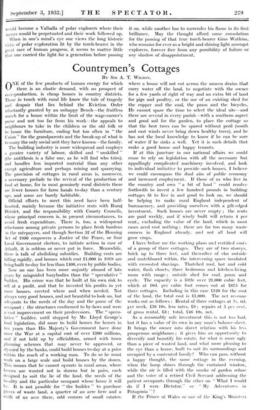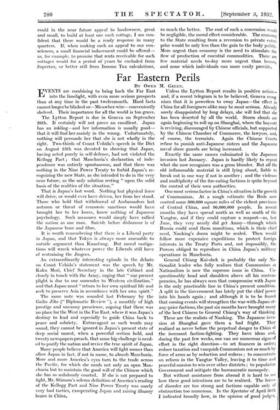Countrymen's Cottages
BY SIR A. T. Wthsox.
ONE of the few products of human energy for which there is an .elastic demand, with no prospect of over-production, is cheap houses in country districts. Those in touch with rural life know the tale of tragedy and despair that lies behind the Eviction Order reluctantly granted by an unhappy Bench—the fruitless search for a house within the limit of the wage-earner's purse and not too far from his work—the appeals to neighbours to take in the children or the old folk or to house the furniture, ending but too often in " the Union " for the grandparents and the break-up of what is to many the only social unit they have known—the family.
The building industry is more widespread and employs a greater. variety of labour, skilled and " unskilled " (the antithesis is a false one, as he will find who tries), and handles less- imported material than any other except agriculture and perhaps mining and quarrying. The provision of cottages in rural areas is, moreover, a necessary, prelude to the revival of the production of food at home, for in most genuinely:rural districts there are fewer, houses for farm hands to-day than a century ago, and some are barely habitable.
Official efforts to meet this need have been half- hearted, mainly because the initiative rests with Rural District, and the responsibility with County Councils, whose principal concern is, in present circumstances, to avoid fresh expenditure. There is, too, a widespread reluctance among private persons to place fresh burdens an the ratepayers, and though Section 52 of the HoUsing Act of 1930 empowers a Justice of the Peace, or four Local Government electors, to initiate action in case of default, it is seldom or never put in force. Meanwhile, there is talk of abolishing subsidies. Building costs are falling rapidly, and houses which cost £1,000 in 1919 are being built to-day for less than £400, even by public bodies.
Now no one has been more unjustly abused of late years by misguided busybodies than the " speculative " builder. His crime was that he built at his own risk to sell at a profit, and that he invested his profits in yet more houses, erected where and when needed. Not always very good houses, and not beautiful to look on, but adequate to the needs of the day and the purse of the occupant : the structures conformed to by-laws and were a vast improvement on their predecessors. The " specu- lative " builder, until stopped by Mr. Lloyd George's land legislation, did more to build homes for heroes in ten years than His Majesty's Government have done since the War at a capital cost of over £200 millions, and if not held up, by officialdom, armed with town planning schemes that may never be approved, or stymied by the banks, could build houses to-day at a price within the. reach of a working man. To do so he must -work on large scale and build houses by the dozen. This means that he. cannot operate in rural areas, where houses are wanted not in dozens but in pairs, each designed .to suit the _lie of the land, the needs of the locality and the particular occupant whose home it will be. It is not ,possible for " the builder " to purchase pieces of waste land, a quarter of an acre here and a sixth of an acre there, odd corners of small estates, where a house will not cut across the unseen drains that carry water off the land, to negotiate with the owner for a few, yards of right of way and an extra bit of land for pigs and poultry, or the use of an existing shed for : the copper and the coal, the pram and the bicycles.
He cannot spare the time to select the ideal site—and there are several in every parish—with a southern aspect and good soil for the garden, to place the cottage so .that :the best trees can be spared without peril (south and east winds never bring down healthy trees), and he has not the local knowledge to know if he can be sure of water if he sinks a well. Yet it is such details that make a good house and happy tenants.
If at this juncture in our national affairs we could cease to rely on legislation with all the necessary but appallingly complicated machinery involved, and look to individual initiative to provide such houses, I believe we could encompass the dual aim of public economy and increased employment. If those of us who live in the country and own " a bit of land " could resolve forthwith to invest a few hundred pounds in building cottages fit to live in and good to look on, we should be helping to make rural England independent of bureaucracy, and providing ourselves with a gilt-edged investment. Such houses are never empty ; the rents are paid weekly, and if wisely built will return 4 per cent., excluding the value of the land, which in most eases need cost nothing ; there arc far too many waste corners in England already, and not all land will grow crops.
I have before me the working plans and certified costs of a group of three cottages. They are of two storey's, brick up to three feet, and thereafter of elm outside and matchboard within, the intervening space insulated with creosoted shavings. Thatched roof, hot and cold water, flush closets, three bedrooms and kitchen-living room with range ; outside shed for coal, pram and cycle. The capacity is a little over 21,000 cubic feet, which at 10d. per cubic foot comes out at £875 for three cottages. Including in this case £120 for the cost of the land, the total cost is £1,000. The net revenue works out as follows : Rental of three cottages at 7s. 6d. per week, £58 10s. less rates, £9 ; repairs at 5 per cent-. of gross rental, £3 ; total, £46 10s. net.
As a reasonably safe investment this is not too bad, but it has a value of its own in any man's balance-sheet. It brings the owner into direct relation with his less prosperous neighbours ; it gives him an opportunity, to diversify and .beautify his estate, for what is more ugly than a piece of wasted land, and what more pleasing to the eye than a house, built to suit its surroundings and occupied by a contented family? Who can pass, without a happy thought, the same cottage in the evening-, when the lamp shines through the curtained window, while the air is filled with the smoke of garden refuse and the voice of a retired Civil Servant addressing the patient occupants, through- the ether on " What I would do if I were Dictator," or " My Adventures in Patagonia " ?
If the Prince of Wales or one of the King's Ministers could in the near future appeal to landowners, great and small, to build at least one such cottage, I am con- fident that there would be a ready response in many quarters. If, when making such an appeal to our con- sciences, a small financial inducement could be offered— as, for example, to promise that rents receivable for such cottages would for a period of years be excluded from Supertax, or better still from Income Tax calculationS, so much the better. The cost of such a concession would be negligible, the moral effect considerable. The economy to the State resulting from a reversion to private enter- prise would be only less than the gain to the body politic. More urgent than economy is the need to stimulate the flow of production of essential commodities. There are few material needs to-day more urgent than houses, and none which individuals can more easily provide.































 Previous page
Previous page